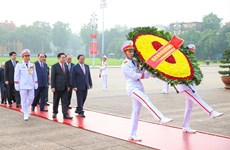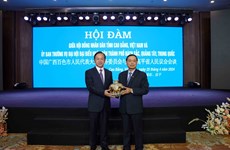East Sea conference: Sea space - common heritage of humankind
The tension in the East Sea could negatively
affect the preservation and development of maritime resources while
threatening security on international routes in the area, experts
warned.
The recent escalating tension in the East Sea could negatively
affect the preservation and development of maritime resources while
threatening security on international routes in the area, experts
warned.
They voiced the warning at the sixth International Conference on the East Sea that opened on November 17 in the central city of Da Nang.
The conference brought together academics and specialists from Vietnam, Southeast Asian countries, the US, China, Taiwan (China), the Republic of Korea, Australia, India, the UK, France, Italy and Belgium.
The experts pointed to a paradox that while the regional community has worked hard to avoid disputes, some countries are creating low-level tensions which they thought they can take control since no direct confrontation yet occurred.
The experts called it a very dangerous sign when a code of conduct or a legally-binding accord to manage clashes and disputes in the East Sea remains absent.
They noted that China’s attempt to expand its reinforcement activities on rock reefs in Truong Sa (Spratly) archipelago could likely pose a threat of dispute to the East Sea.
They agreed that one of the major factors affecting the recent East Sea situation is differing explanation and application of international law in the sea.
They shared the view that the increased number and intensity of operations of armed and semi-armed forces in the East Sea led to recent tensions in the area.
According to former Vice Admiral Anup Singh, former Flag Office Commander-in-Chief of the Eastern Naval Command of India, the right to access natural resources has always been the main reason behind disputes.
The East Sea is one of the richest seas in the world in terms of fossil fuel reserves and seafood sources, he noted.
He stressed the East Sea route’s irreplaceable role in the traffic of goods to East Asia, Southeast Asia and the rest of the world since nearly a half of the globe’s trading activities depend on peace in the area.
The world community should raise their voice and support littoral countries in the East Sea by calling for safeguarding maritime freedom and conserving sea space as a common heritage of mankind, the Indian speaker added.
Former Rear Admiral Akimoto Kazumine, a senior researcher from the Japan ’s Ocean Policy Research Foundation, stressed since the East Sea is a lifeline route for regional countries, stability in the area is needed to ensure maritime safety.
The participants highlighted the reasons that encourage parties concerned to foster cooperation in the East Sea , including the demand for natural resources to serve their national development, and the preservation of maritime security, safety and freedom on international shipping routes.
They spoke highly of efforts to set up a hotline for parties involved in the East Sea, proposing the building of regulations on the operation of the communication tool and the handling of information exchanged.
Themed “East Sea: Cooperation for Regional Security and Development,” the two-day conference is the continuance of efforts to exchange opinions and seek experts’ ideas for the East Sea issue.
During the event, the participants will also discuss international law in dealing with disputes, as well as measures to build trust and prevent maritime disputes.-VNA
They voiced the warning at the sixth International Conference on the East Sea that opened on November 17 in the central city of Da Nang.
The conference brought together academics and specialists from Vietnam, Southeast Asian countries, the US, China, Taiwan (China), the Republic of Korea, Australia, India, the UK, France, Italy and Belgium.
The experts pointed to a paradox that while the regional community has worked hard to avoid disputes, some countries are creating low-level tensions which they thought they can take control since no direct confrontation yet occurred.
The experts called it a very dangerous sign when a code of conduct or a legally-binding accord to manage clashes and disputes in the East Sea remains absent.
They noted that China’s attempt to expand its reinforcement activities on rock reefs in Truong Sa (Spratly) archipelago could likely pose a threat of dispute to the East Sea.
They agreed that one of the major factors affecting the recent East Sea situation is differing explanation and application of international law in the sea.
They shared the view that the increased number and intensity of operations of armed and semi-armed forces in the East Sea led to recent tensions in the area.
According to former Vice Admiral Anup Singh, former Flag Office Commander-in-Chief of the Eastern Naval Command of India, the right to access natural resources has always been the main reason behind disputes.
The East Sea is one of the richest seas in the world in terms of fossil fuel reserves and seafood sources, he noted.
He stressed the East Sea route’s irreplaceable role in the traffic of goods to East Asia, Southeast Asia and the rest of the world since nearly a half of the globe’s trading activities depend on peace in the area.
The world community should raise their voice and support littoral countries in the East Sea by calling for safeguarding maritime freedom and conserving sea space as a common heritage of mankind, the Indian speaker added.
Former Rear Admiral Akimoto Kazumine, a senior researcher from the Japan ’s Ocean Policy Research Foundation, stressed since the East Sea is a lifeline route for regional countries, stability in the area is needed to ensure maritime safety.
The participants highlighted the reasons that encourage parties concerned to foster cooperation in the East Sea , including the demand for natural resources to serve their national development, and the preservation of maritime security, safety and freedom on international shipping routes.
They spoke highly of efforts to set up a hotline for parties involved in the East Sea, proposing the building of regulations on the operation of the communication tool and the handling of information exchanged.
Themed “East Sea: Cooperation for Regional Security and Development,” the two-day conference is the continuance of efforts to exchange opinions and seek experts’ ideas for the East Sea issue.
During the event, the participants will also discuss international law in dealing with disputes, as well as measures to build trust and prevent maritime disputes.-VNA













